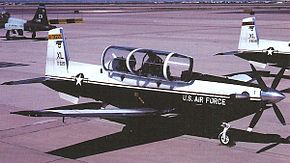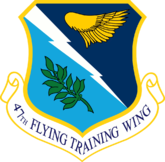This article includes a list of general references, but it lacks sufficient corresponding inline citations. (January 2013) |
The 47th Flying Training Wing is a United States Air Force pilot training wing based at Laughlin Air Force Base, near Del Rio, Texas. It is one of five pilot training units in the Air Force's Air Education and Training Command which conducts joint specialized undergraduate pilot training for the United States Air Force, Air Force Reserve, Air National Guard and allied nation air forces utilizing the T-38C, T-6A and T-1A aircraft.
47th Flying Training Wing
 | |
|---|---|
 T-6 Texan IIs of the 47th Flying Training Wing | |
| Active | 1947–1949; 1951–1962; 1972–present |
| Country | |
| Branch | |
| Role | Pilot Training |
| Size | Wing |
| Part of | Air Education & Training Command |
| Garrison/HQ | Laughlin Air Force Base |
| Decorations | Air Force Outstanding Unit Award |
| Commanders | |
| Notable commanders | Donald G. Cook John W. Doucette |
| Insignia | |
| 47th Flying Training Wing emblem (approved 2 January 1973)[1] |  |
| Patch with 47th Bombardment Wing emblem (approved 26 October 1951)[2] |  |
Units edit
- 47th Medical Group
- 47th Medical Operations Squadron
- 47th Medical Support Squadron
- 47th Mission Support Group
- 47th Security Forces Squadron "Amistad Defenders" Camp Bucca, 886th Expeditionary Security Forces Squadron
- 47th Operations Group (Tail Code: XL)
- 47th Operations Support Squadron
- 85th Flying Training Squadron (T-6A) "Tigers"
- 434th Flying Training Squadron (T-6A) "Red Devils"
- 86th Flying Training Squadron (T-1A) "Rio Lobos"
- 87th Flying Training Squadron (T-38C) "Red Bulls"
- 340th Flying Training Group (AFRC)
- 96th Flying Training Squadron (T-38C, T-1A)
Aircraft flown edit
- T-41 Mescalero, 1972–1973
- T-37 Tweet, 1972–2004
- T-38 Talon, 1972–present
- T-1A Jayhawk, 1993–present
- T-6 Texan II, 2002–present
- T-7A Red Hawk, 2023
History edit
- See 47th Operations Group for additional history and lineage information prior to 1947
Cold War edit
Light bombardment operations in the United States edit
On 28 July 1947, the 47th Bombardment Wing was established as part of the Army Air Forces' implementation of the wing base reorganization, which combined tactical and support elements on its bases into a single wing. The wing became active on 15 August 1947 at Biggs Field, Texas, with the 47th Bombardment Group as its operational unit.[1] On 1 February 1948 Biggs was turned over to Strategic Air Command, forcing a relocation of the wing to Barksdale Air Force Base, Louisiana in November. In the fall of 1948 North American B-45 Tornado bombers began to be delivered to the wing, which became the first in the Air Force to fly the aircraft.[3] However, the B-45As were not truly operational, because they lacked both fire control and bombing equipment.[4]
The Air Force planned to equip five groups with the B-45, but in programming the units that would comprise its forty-eight group structure authorized in 1948, the number of light bombardment groups flying the B-45 was reduced to one. With this reduction, the Air Force decided to inactivate the 47th wing and transfer its B-45s to the 3d Bombardment Wing in Japan. However, the first B-45As delivered to the wing lacked sufficient range to ferry across the Pacific and they were too large to send on board available ships.[4] The additional high cost of maintaining its B-45 aircraft led the Air Force to inactivate the 47th on 2 October 1949.[1][4] However, the 84th and 85th squadrons of the 47th Bombardment Group kept their B-45s and moved to Langley Air Force Base, Virginia where they were attached to the 363d Tactical Reconnaissance Wing.[5][6][7]
On 12 March 1951, the 47th wing and group were reactivated at Langley, along with a number of support organizations to join the 84th and 85th Bombardment Squadrons.[9][10] The wing was assigned to Tactical Air Command (TAC).
European operations edit
After becoming proficient in the handling and use of nuclear weapons, the wing moved to RAF Sculthorpe, United Kingdom where it began operations there on 1 June 1952. Operational squadrons of the wing included the 84th, 85th, and 86th Bombardment Squadrons.
In 1962 Project Clearwater halted large scale bomber deployments to Britain with Sculthorpe, along with RAF Fairford, RAF Chelveston, and RAF Greenham Common, being turned over to the British Air Ministry. This resulted in the 47th Bomb Wing being inactivated on 22 June 1962.
Pilot training edit
The 47th Flying Training Wing was reactivated and redesignated at Laughlin Air Force Base, Texas on 1 September 1972, replacing and absorbing the resources of the 3646th Pilot Training Wing. Since its reactivation, the wing has conducted undergraduate pilot training for USAF, Air Force Reserve, and friendly foreign nation air forces. It supported Accelerated Co-Pilot Enrichment Program at numerous locations, 1976–1986. Began airlifter-tanker track pilot training in 1994.
Lineage edit
- Designated as 47th Bombardment Wing, Light on 28 July 1947
- Organized on 15 August 1947
- Inactivated on 2 October 1949
- Activated on 12 March 1951
- Redesignated 47th Bombardment Wing, Tactical on 1 October 1955
- Discontinued and inactivated on 22 June 1962
- Redesignated 47th Flying Training Wing on 22 March 1972
- Activated on 1 September 1972
Assignments edit
- Twelfth Air Force, 15 August 1947 – 2 October 1949
- Tactical Air Command, 12 March 1951 (attached to 49th Air Division 12 February 1952)
- Third Air Force, 5 June 1952 (remained attached to 49th Air Division to 1 July 1956)
- Seventeenth Air Force, 1 July 1961 – 22 June 1962
- Air Training Command, 1 September 1972
- Nineteenth Air Force, 1 July 1993 – present
Components edit
Wing
- 392d Bombardment Wing: attached 27 June 1949 – 2 October 1949
Groups
- 47th Bombardment Group (later 47th Operations Group): 15 August 1947 – 2 October 1949; 12 March 1951 – 8 February 1955; 15 December 1991 – present
- 4400th Combat Crew Training Group: attached 12 March 1951 – 12 February 1952
Squadrons
- 19th Tactical Reconnaissance Squadron: attached 7 May 1954 – 1 December 1956
- 39th Flying Training Squadron: 2 April 1990 – 15 December 1991
- 84th Bombardment Squadron: attached 17 November 1952 – 7 February 1955, assigned 8 February 1955 – 22 June 1962
- 84th Flying Training Squadron: 2 April 1990 – 15 December 1991
- 85th Bombardment Squadron (later 85th Flying Training Squadron): attached 17 November 1952 – 7 February 1955, assigned 8 February 1955 – 22 June 1962; assigned 1 September 1972 – 15 December 1991
- 86th Bombardment (later, 86th Flying Training) Squadron: attached 23 March 1954 – 7 February 1955, assigned 8 February 1955 – 22 June 1962; assigned 1 September 1972 – 15 December 1991
- 87th Flying Training Squadron: 2 April 1990 – 15 December 1991
- 420th Air Refueling Squadron: attached 15 March 1960 – 7 November 1961, assigned 8 November 1961 – 22 June 1962
- 422d Bombardment Squadron: attached 20 December 1953 – 23 March 1954.
Stations edit
- Biggs Field (later Biggs Air Force Base), Texas, 15 August 1947 – 19 November 1948
- Barksdale Air Force Base, Louisiana, 19 November 1948 – 2 October 1949
- Langley Air Force Base, Virginia, 12 March 1951 – 21 May 1952
- RAF Sculthorpe, England, 1 June 1952 – 22 June 1962
- Laughlin Air Force Base, Texas, 1 September 1972 – present
References edit
Notes edit
- ^ a b c Bailey, Carl E. (10 September 2008). "Factsheet 47 Flying Training Wing (AETC)". Air Force Historical Research Agency. Retrieved 13 December 2016.
- ^ Maurer, Combat Units, pp. 104–106
- ^ Knaack, p. 72
- ^ a b c Knaack, pp. 74–75
- ^ Maurer, Combat Squadrons. pp. 291–292
- ^ Maurer, Combat Squadrons, pp. 294–295
- ^ Ravenstein, pp. 191–194
- ^ Identifiable aircraft are (nearest to farthest) 47-082, 47-089, 47-050, 47-061, 47-058, 47-081, 47-059, 47-064.
- ^ Maurer, pp. 104–106
- ^ Mueller, Robert (1989). Air Force Bases, Vol. I, Active Air Force Bases Within the United States of America on 17 September 1982 (PDF). Washington, DC: Office of Air Force History. p. 315. ISBN 0-912799-53-6.
Bibliography edit
This article incorporates public domain material from the Air Force Historical Research Agency
- Endicott, Judy G., USAF Active Flying, Space, and Missile Squadrons as of 1 October 1995. Office of Air Force History
- Knaack, Marcelle Size (1988). Encyclopedia of US Air Force Aircraft and Missile Systems. Vol. 2, Post-World War II Bombers 1945–1973. Washington, DC: Office of Air Force History. p. 72. ISBN 0-912799-59-5.
- Maurer, Maurer, ed. (1983) [1961]. Air Force Combat Units of World War II (PDF) (reprint ed.). Washington, DC: Office of Air Force History. ISBN 0-912799-02-1. LCCN 61060979.
- Maurer, Maurer, ed. (1982) [1969]. Combat Squadrons of the Air Force, World War II (PDF) (reprint ed.). Washington, DC: Office of Air Force History. ISBN 0-405-12194-6. LCCN 70605402. OCLC 72556.
- Ravenstein, Charles A. (1984). Air Force Combat Wings, Lineage & Honors Histories 1947–1977. Washington, DC: Office of Air Force History. ISBN 0-912799-12-9.
- Ravenstein, Charles A. (1984). Air Force Combat Wings, Lineage & Honors Histories 1947–1977. Washington, DC: Office of Air Force History. ISBN 0-912799-12-9.
External links edit
- USAAS-USAAC-USAAF-USAF Aircraft Serial Numbers--1908 to present
- Joe Baugher's Encyclopedia Of Military Aircraft (A-20, A-26, B-45, B-66, KB-50)
- 420th Air Refueling Squadron
- Laughlin Air Force Base web site
- "47th Bomb Wing in WWII". Archived from the original on 24 June 2018. Retrieved 24 June 2018.